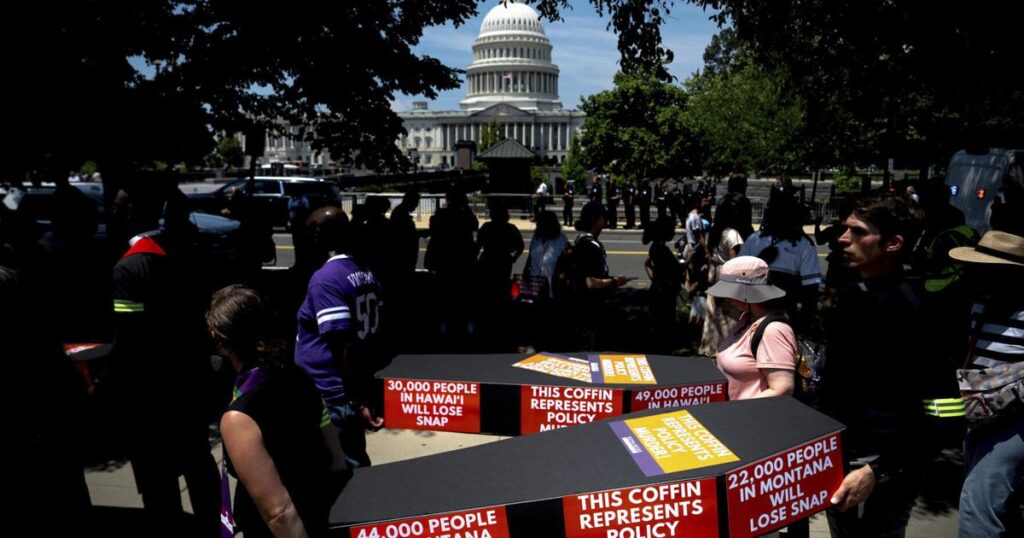WASHINGTON — Senate Republicans successfully passed President Donald Trump’s sweeping tax breaks and spending cuts bill early Tuesday morning, navigating a turbulent overnight session that required Vice President JD Vance to break a 50-50 tie. The passage marked a significant, albeit narrow, victory for the GOP, who faced opposition not only from Democrats but also within their own ranks.
The tense weekend session at the Capitol highlighted the precarious nature of the president’s legislative agenda. The bill, known formally as the “One Big Beautiful Bill Act,” is a cornerstone of Trump’s policy objectives, yet its passage through the Senate was fraught with challenges. The legislation now returns to the House, where Speaker Mike Johnson has cautioned against significant deviations from the version previously approved by his chamber.
Contentious Amendments and Internal GOP Struggles
The Senate’s version of the bill includes notable changes, particularly concerning Medicaid, which could complicate its final approval as lawmakers race to meet Trump’s Fourth of July deadline. Demonstrators gathered outside the U.S. Capitol, carrying cardboard caskets to protest the proposed cuts.
Senate Majority Leader John Thune of South Dakota played a pivotal role in securing the bill’s passage, engaging in last-minute negotiations with party members concerned about the bill’s impact on Medicaid. The GOP’s slim majority meant Thune could afford to lose no more than three Republican votes, with Senators Thom Tillis and Rand Paul already expressing opposition.
Attention turned to Senators Lisa Murkowski of Alaska and Susan Collins of Maine, who voiced concerns over healthcare cuts. Murkowski, in particular, became a focal point for GOP leaders, who engaged in intensive discussions to secure her support.
Fiscal Implications and Political Reactions
The bill’s fiscal implications are significant. An analysis by the nonpartisan Congressional Budget Office (CBO) projects that the legislation would increase the deficit by nearly $3.3 trillion over the next decade, with an estimated 11.8 million more Americans becoming uninsured by 2034. Despite these figures, the GOP has pushed forward, citing the need for economic growth and fiscal responsibility.
“Republicans are in shambles because they know the bill is so unpopular,” said Senate Democratic Leader Chuck Schumer of New York.
On social media, billionaire Elon Musk criticized the GOP, dubbing them the “PORKY PIG PARTY” for the bill’s inclusion of a $5 trillion debt ceiling increase, necessary to continue government borrowing.
Key Provisions and Legislative Challenges
The Senate bill encompasses $4.5 trillion in tax cuts, making permanent Trump’s 2017 tax rates, which are set to expire at the end of the year. The legislation also proposes rolling back billions in green energy tax credits, a move Democrats argue will undermine renewable energy investments.
Significant cuts to Medicaid and food stamps are also included, with the introduction of work requirements for able-bodied individuals, including some parents and older Americans. The bill allocates $350 billion for border and national security, partially funded by new fees on immigrants.
Despite the GOP’s efforts, few Republicans expressed complete satisfaction with the final package. Senator Collins’ proposal to double the rural hospital fund was rejected, while Murkowski sought provisions to protect her state’s residents from food stamp cuts.
Democratic Resistance and Future Prospects
Democrats, unable to halt the bill’s progression, attempted to prolong the process with a weekend reading of the full text. Some Democratic amendments gained partial Republican support, though few were successful.
Senator Patty Murray criticized the GOP’s accounting methods, stating, “Magic math won’t fly with Americans trying to balance their own household books.”
As the bill moves back to the House, its future remains uncertain. Speaker Johnson’s warning against significant alterations suggests potential conflicts, particularly with the Senate’s Medicaid amendments. The GOP’s ability to unify and finalize the legislation will be a critical test of their legislative prowess.
Stay informed on the latest developments in government and politics by subscribing to our newsletter.
About The Author
 “The Bear” and “28 Years Later” Dominate Streaming Spotlight
“The Bear” and “28 Years Later” Dominate Streaming Spotlight Wilmington Man Faces Serious Charges in Drug and Firearm Bust
Wilmington Man Faces Serious Charges in Drug and Firearm Bust Iran Evaluates Nuclear Site Damage Amid Tensions with Israel and U.S.
Iran Evaluates Nuclear Site Damage Amid Tensions with Israel and U.S. Trump Visits Controversial Florida Detention Center Amid Protests and Political Debate
Trump Visits Controversial Florida Detention Center Amid Protests and Political Debate Senate Approves Trump’s Comprehensive Domestic Policy Bill
Senate Approves Trump’s Comprehensive Domestic Policy Bill